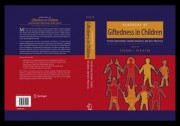 Though not often recognized as “special needs” students, gifted children require just as much attention and educational resources to thrive in school as do other students whose physical, behavioral, emotional or learning needs require special accommodations. So says a Florida State University professor who has studied gifted students for years. [continue reading…]
Though not often recognized as “special needs” students, gifted children require just as much attention and educational resources to thrive in school as do other students whose physical, behavioral, emotional or learning needs require special accommodations. So says a Florida State University professor who has studied gifted students for years. [continue reading…]
Education

New transatlantic research has discovered that sad children do better than happy children in particular educational tasks.
Psychologists at the Universities of Plymouth and Virginia have conducted experimental research that contrasts with the belief that happy children are the best learners. The findings show that where attention to detail is required, happy children may be at a disadvantage. [continue reading…]
 People use eye contact in a variety of ways every minute of every day but how often do you find yourself staring into space with concentrating on an issue or problem? Psychologists now know that people who are carrying out a complex task tend to look away from anyone else who is nearby. They refer to it as ‘gaze aversion’.
People use eye contact in a variety of ways every minute of every day but how often do you find yourself staring into space with concentrating on an issue or problem? Psychologists now know that people who are carrying out a complex task tend to look away from anyone else who is nearby. They refer to it as ‘gaze aversion’.
Now they are finding out how to use changes in a child’s gaze aversion to understand their educational progress. A group led by Dr Gwyneth Doherty-Sneddon at the University of Stirling, and funded by Economic and Social Research Council, has looked at gaze aversion in both children and adults. [continue reading…]
Kids may roll their eyes when their mother asks them about their school day, but answering her may actually help them learn. New research from Vanderbilt University reveals that children learn the solution to a problem best when they explain it to their mom.
“We knew that children learn well with their moms or with a peer, but we did not know if that was because they were getting feedback and help,” Bethany Rittle-Johnson, the study’s lead author and assistant professor of psychology at Vanderbilt’s Peabody College of education and human development, said. “In this study, we just had the children’s mothers listen, without providing any assistance. We’ve found that by simply listening, a mother helps her child learn.”
Rittle-Johnson believes the new finding can help parents better assist their children with their schoolwork, even when they are not sure of the answer themselves. Although the researchers used children and their mothers in the study, they believe the same results will hold true whether the person is the child’s father, grandparent, or other familiar person.
The basic idea is that it is really effective to try to get kids to explain things themselves instead of just telling them the answer,” she said. “Explaining their reasoning, to a parent or perhaps to other people they know, will help them understand the problem and apply what they have learned to other situations.”
The research is currently in press at the Journal of Experimental Child Psychology.
Rittle-Johnson, along with co-authors Megan Saylor, assistant professor of psychology, and recent graduate Kathryn Swygert, set out to determine if 4- and 5-year-olds learn more when they have to explain the solution to a problem to someone else. They were shown a series of plastic bugs, and then had to say which bug should come next in the series based on color and type of bug, a problem that is challenging for 4- and 5-year-olds. The children were told to explain the solution to their moms, to themselves or to simply repeat the answer out loud.
The researchers found that explaining the answer to themselves and to their moms improved the children’s ability to solve similar problems later, and that explaining the answer to their moms helped them solve more difficult problems.
“We saw that this simple act of listening by mom made a difference in the quality of the child’s explanations and how well they could solve more difficult problems later on,” Rittle-Johnson said.
The researchers also found that children experience the benefit of explaining a solution at an earlier age than previously thought.
“This is one of the first studies to examine whether or not explanation is useful in helping children under 8 apply what they’ve learned to a modification of a task,” Rittle-Johnson said. “We found that even 4-year-olds can use explanation to help them learn and to apply what they’ve learned to other tasks.”
The new research was supported by funds from Peabody College. Rittle-Johnson and Saylor are Learning Sciences Institute and Vanderbilt Kennedy Center for Research on Human Development investigators.
Source: Vanderbilt Univesity, Vanderbilt University’s Peabody College was ranked as the No. 3 education school in the nation by U.S. News & World Report in 2007. To learn more about Peabody, visit peabody.vanderbilt.edu.
